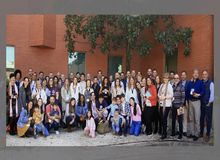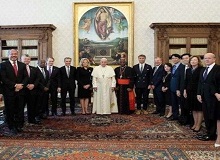

.jpg)
Around 400,000 employees of large companies offer leaves for transitioners which are more generous than those offered to women after childbirth.

From Venezuela to the Canary Islands, from a laundry to the Royal House. Yukonda Esparragoza shares her experience of living “miracle after miracle”.

The European Freedom Network (EFN) asks parliamentarians in Brussels to pass legislation that forces companies to identify and address human exploitation.

They gathered for the 11th Spanish national meeting to encourage each other to be professionals with a mission perspective.

Ignacio Rodriguez, a Spanish real estate professional, recalls how the economic crisis of 2008 helped him to refocus his financial life from a biblical perspective.

Well-known actress Ana Obregón resorts to surrogacy at 68 and sparks an intense political and media debate.

Pedro Augusto Vidal, director of a Portuguese automation services company, shares his story and the principles that have driven his business.

A Spanish Christian trucker and entrepreneur shares about how his Christian faith impacted over 40 years of work experience.
.png)
Over 200 Romanian entrepreneurs gathered to reflect on how Biblical principles can be integrated into business, and to share common challenges.

A trade unionist, a business owner, and a theology of work expert analyse how to deal with the challenges of labour relations from a biblical perspective.

The Church can and should be a place where people can talk about the loss of their business, their frustration and confusion without being pressured to explain it.

Businessman Rubén García addresses the fast growth of the technology sector, the challenges of the current economic situation, and the importance of support among Christian business leaders.

How does the biblical Christian worldview actually fit into the complex area of labour relations between employers and workers? A trade unionist, a business owner, and a theology of work expert respond.

Anglo Recycling is a textiles recycling business that sees value in providing dignified employment, developing responsibly made products and investing in the community.

Fluid IT aims to provide fairer service and release the potential of technology for his clients, pursuing social impact.

Ethical Addictions produces and sells coffee through direct trade relationships with small-scale, family farmers in South America and Africa.

London-based Yendy Skin began with a mission to bridge the gap between small-scale female farmers and the beauty market.

Just Helpers self-employed staff are paid at least the London Living Wage. This commitment is rooted in the biblical principle of honouring workers.

The Derby-based ice cream business offers a workplace designed around the needs of people with a lived experience of slavery.

The Jericho Foundation started in Edward Road Baptist church as a ‘jobs club’ for the vulnerable and excluded. In the last 15 years, it has directly supported over 8,000 people.

“Surrogacy should not be authorised or legalised”, says the evangelical entity, which denounces that “it attacks women and children human rights”.
.jpg)
The technology-evangelists’ goal is to provide products and services that are so compelling, easy to access, and intuitive to use that we can’t help but adopt them.

New Textile Life is a textile workshop that aims to give people at risk of exclusion “an opportunity to regain an independent life”.


Right now we need to reconnect business to its rightful place within society.

Las opiniones vertidas por nuestros colaboradores se realizan a nivel personal, pudiendo coincidir o no con la postura de la dirección de Protestante Digital.